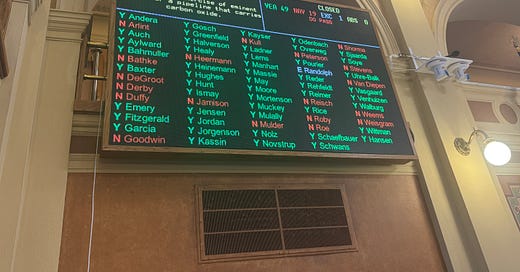Measure stripping carbon pipelines of eminent domain powers marches forward
House votes overwhelmingly to send House Bill 1052 to the Senate
PIERRE — A bill that would put a significant dent in Summit Carbon Solutions’ proposal to build a carbon capture pipeline through eastern South Dakota is on its way to the Senate.
Representatives voted 49-19 to send House Bill 1052 to the opposite chamber, which would strip pipelines carrying carbon dioxide of their ability to use eminent domain in order to seize land easements.
Speaker Pro Tempore Karla Lems, one of the main voices who has risen in opposition to Summit’s project over the years, cast the bill as a simple one, portraying eminent domain as a hulking force lingering over landowners.
NEWS: Sen. Amber Hulse’s voter ID bills turn friends into enemies
“Eminent domain is a power. It is a big heavy hammer that can be easily abused,” Lems said in pitching her bill.
Though the chamber would eventually find itself in strong agreement with the Canton Republican, over an hour of debate ensued on the topic before it was eventually called to a halt by Assistant Majority Leader Marty Overweg.
Several lawmakers argued that the legislation would effectively undermine the Iowa-based pipeline company and ethanol plants looking to attach to it.
“There is a one and a half billion dollar Gevo plant planned for construction,” said Rep. Tim Reisch, who represents the district where that plant is slated to be built. “They need a carbon pipeline in order to make a carbon pipeline viable.”
Republican Drew Peterson echoed a similar sentiment, suggesting that denial now could open the door to other, non-carbon capture pipelines being denied in the future.
“My concern is that this bill could become a vehicle to prevent all forms of energy infrastructure expansion,” Peterson said. “You could easily add oil, natural gas, transition lines or any other to this statute if it’s in your backyard and you don’t like it.”
But shaded by the outcome of Referred Law 21 in the November election, a referral on a law intended to give Summit room to work in South Dakota, the chamber favored Lems’ argument Monday afternoon. Some of SB 201’s biggest proponents from last year found themselves voting “aye,” a result that was greeted by a rare applause from the gallery.
“Property rights should never be controversial. Protecting property rights should never be controversial,” Lems said, capping the lengthy debate.
HB 1052’s easy passage through both committee and the full House bodes well for its chances to reach Gov. Larry Rhoden’s desk — but it now heads to the Senate for consideration. During the 2023 state legislative session, bills aiming to limit carbon pipeline companies’ powers managed to sneak through the House, before dying a quick death in a Senate committee. But with new leadership, members and a well-known public sentiment in play after RL 21, carbon pipeline skeptics feel confident about their chances to bring an end to the three-year debate that has surrounded the project.





















“Property rights should never be controversial. Protecting property rights should never be controversial,” Lems said, capping the lengthy debate.
Bravo, Representative. Thank you for reminding everyone of this very basic tenet of American freedom.
Happy to see this bill moving forward! Cant wait to see the governor sign it!